Unit 2 I often go swimming 课件 (共34张PPT)
文档属性
| 名称 | Unit 2 I often go swimming 课件 (共34张PPT) |
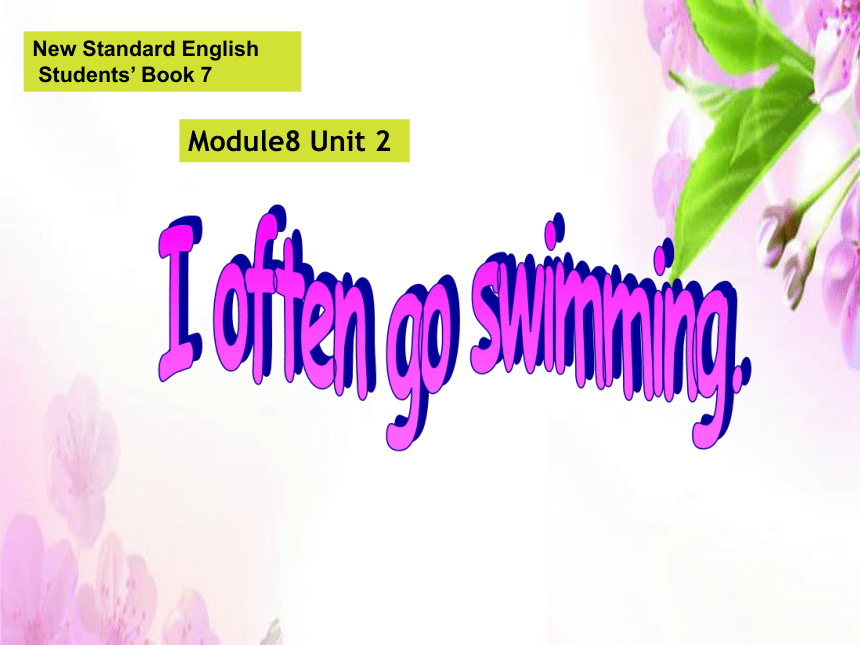
|
|
| 格式 | ppt | ||
| 文件大小 | 1.2MB | ||
| 资源类型 | 教案 | ||
| 版本资源 | 外研版(三年级起点) | ||
| 科目 | 英语 | ||
| 更新时间 | 2018-10-10 00:00:00 | ||
图片预览

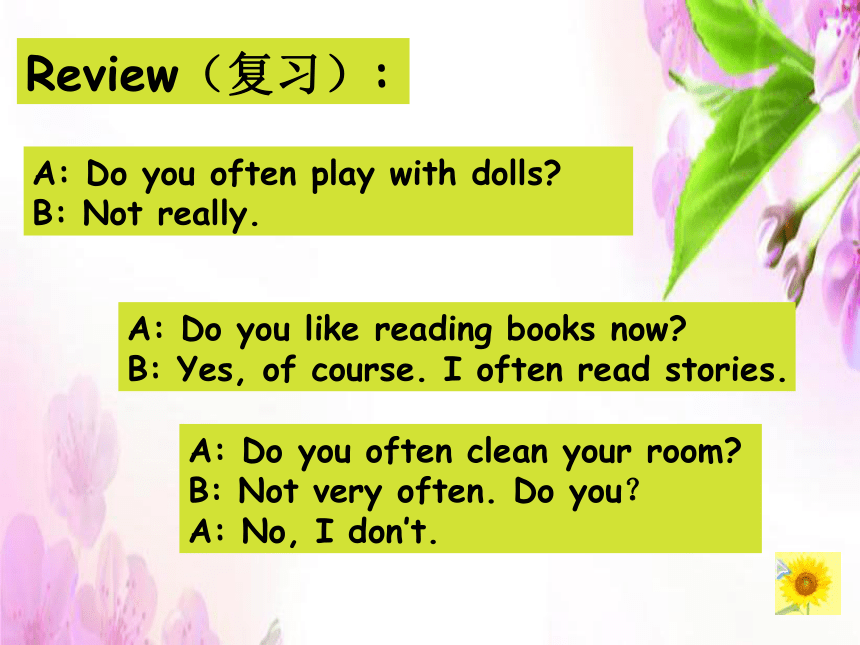
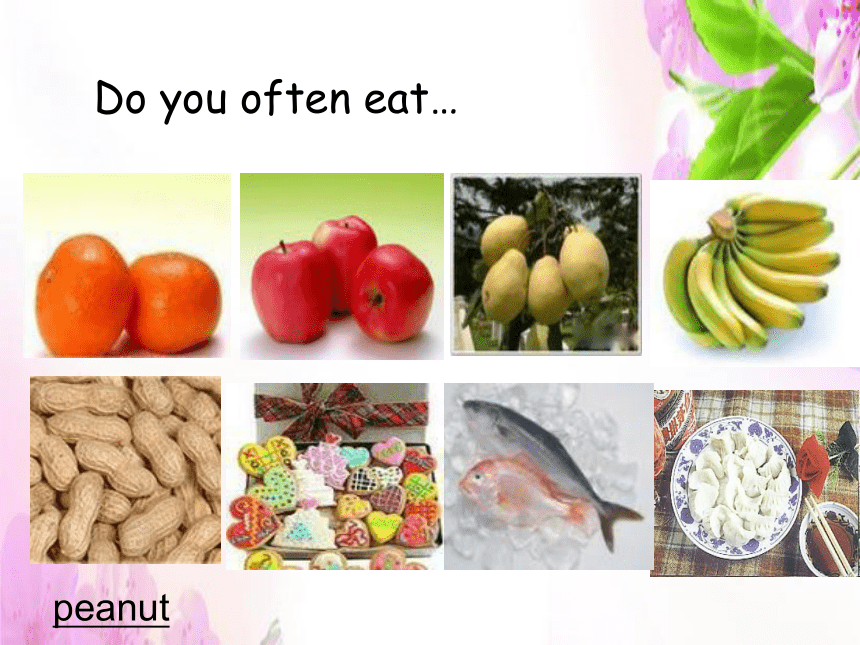
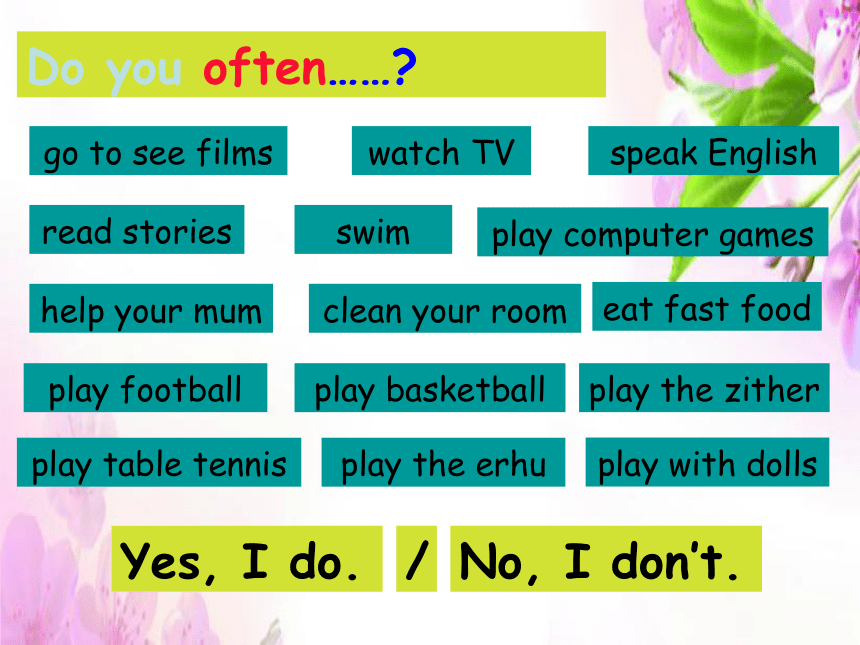
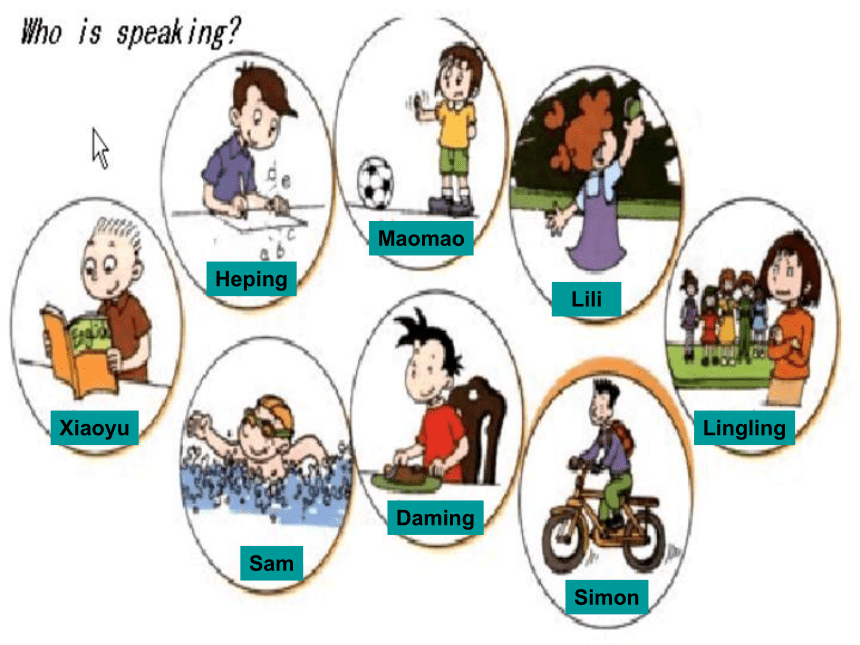
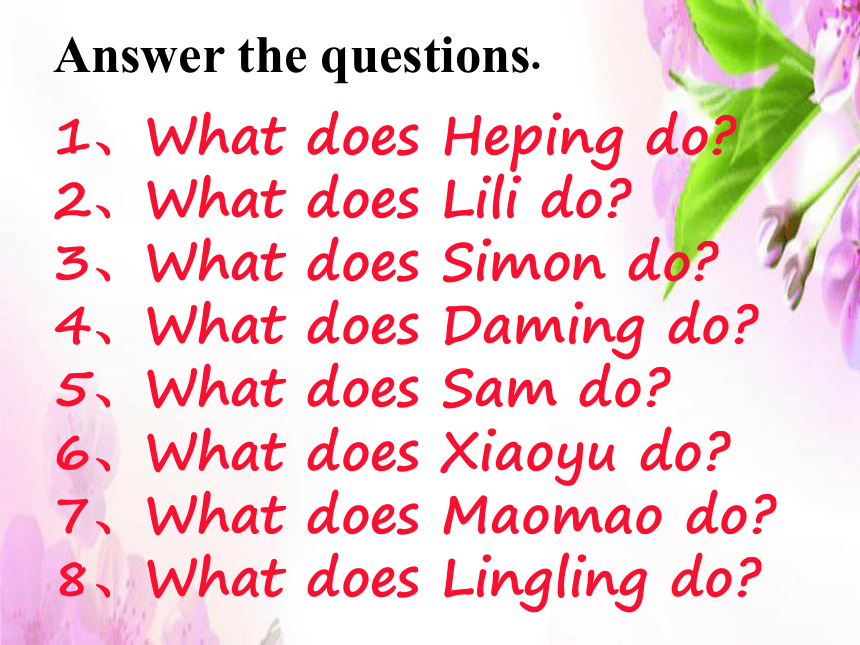
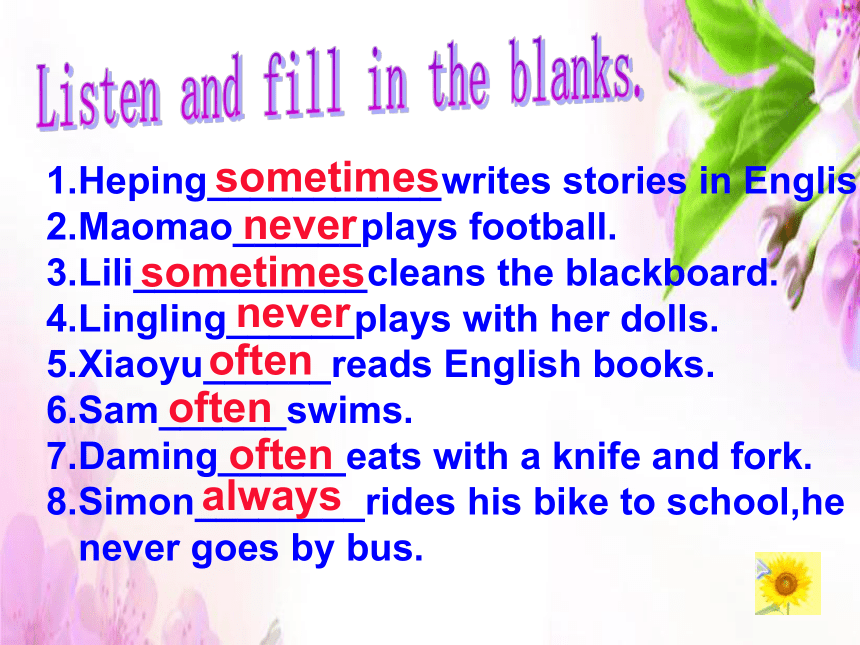
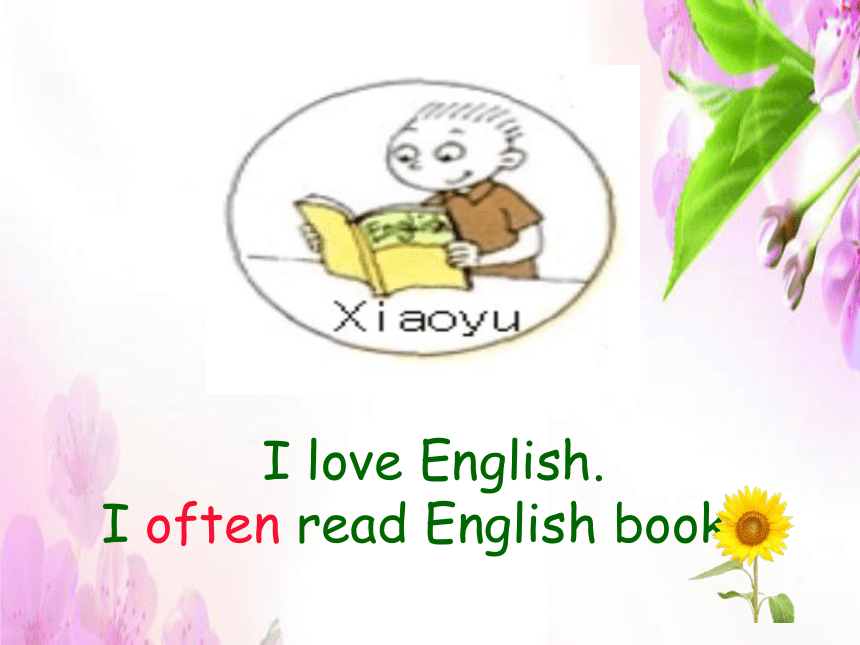
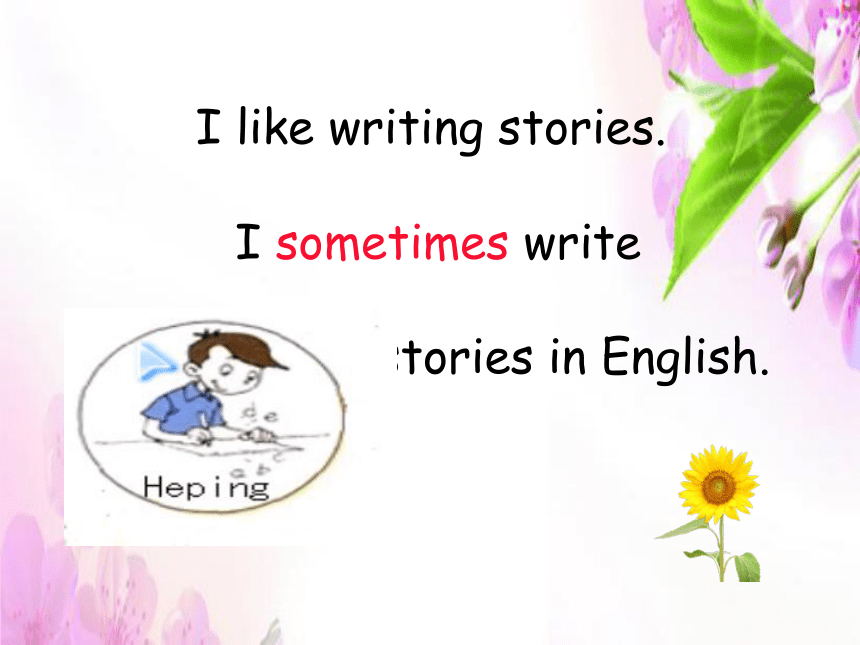
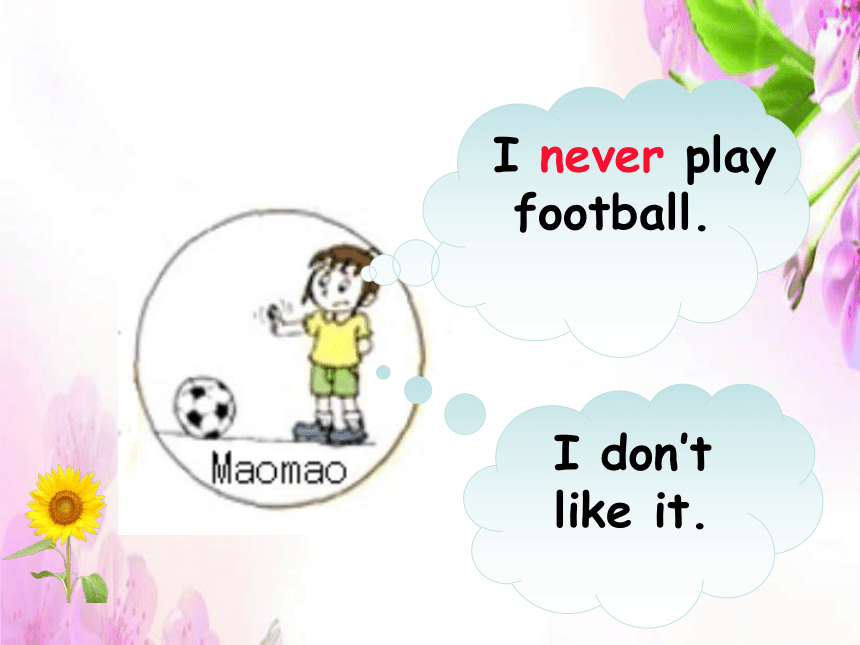


文档简介
(共34张PPT)
New Standard English
Students’ Book 7
Module8 Unit 2
Review(复习):
A: Do you like reading books now
B: Yes, of course. I often read stories.
A: Do you often play with dolls
B: Not really.
A: Do you often clean your room
B: Not very often. Do you?
A: No, I don’t.
Do you often eat…
peanut
go to see films
watch TV
speak English
read stories
swim
play computer games
help your mum
eat fast food
clean your room
play football
play basketball
play table tennis
play the erhu
play the zither
play with dolls
Do you often……
Yes, I do.
No, I don’t.
/
Heping
Xiaoyu
Sam
Maomao
Daming
Lili
Lingling
Simon
Answer the questions.
1、What does Heping do
2、What does Lili do
3、What does Simon do
4、What does Daming do
5、What does Sam do
6、What does Xiaoyu do
7、What does Maomao do
8、What does Lingling do
Heping___________writes stories in English.
Maomao______plays football.
Lili___________cleans the blackboard.
Lingling______plays with her dolls.
Xiaoyu______reads English books.
Sam______swims.
Daming______eats with a knife and fork.
Simon________rides his bike to school,he never goes by bus.
often
sometimes
never
always
often
often
sometimes
never
I love English.
I often read English books.
I like writing stories.
I sometimes write
stories in English.
I never play
football.
I don’t
like it.
I sometimes clean the
blackboard for my
teacher.
I never play
with dolls.
I often go swimming.
I often eat
with a knife and
fork.
But I like chopsticks.
I always ride my bike to
school.
I never go
by bus.
Make sentences using
“sometimes、often、always、never”.
Practice
Mon. Tue. Wed. Thu. Fri. Sat. Sun.
read books √ √ √ √ √ √ √
Listen to music √ √ √ √ √
watch TV √ √
clean room √ √ √
swim in winter
help my mum √ √ √ √
Look at the table about me,fill in the blanks with “never、sometimes、often、always”
(1) I read books.
(2) I listen to music.
(3) I watch TV .
(4) I clean room.
(5) I swim in the river in winter.
(6) I help my mum.
always
often
sometimes
sometimes
never
often
频度副词
单词 词义 大致发生的频率
always 总是 100%
usually 通常 80%
often 经常 60%
sometimes 有时 30%
never 从不 0%
always(100%)>usually(80%)>often(60%)>sometimes(40%)> never(0%)
often sometimes never always
I read English books.
I play computer games.
I sing English songs.
I speak English.
I draw pictures.
I write emails.
I ride a bike.
I eat breakfast.
Read and tick. About you.(Using ”√”),
Then write a short message.
频度副词的位置
◆频度副词在句中习惯上位于be动词、助动词等之后,行为动词之前。
1. 在be动词之后。如:
She is sometimes very busy.
她有时很忙。
2. 在第一个助动词或情态动词之后。如:
I will never forget this lesson.
我将永远忘不了这一课。
3. 在实义动词之前。如:
We often go there. 我们常去那儿。
◆sometimes也可放在句首、句中或句末,often也可放在句末(一般不放在句首)。如:
Sometimes she writes to me.
She writes to me sometimes.
她有时候给我写信。
She writes to me often. 她经常给我写信。
◆如果有两个助动词,频度副词通常放在第一个助动词后面。如:
We have never been invited to one of their parties.
他们聚会,一次也没邀请过我们。
She must sometimes have wanted to run away.
她有时候一定想到过要逃走。
always 频率最高,表示动作重复、状态继续,表示“一直、总是”,其反义词为never。
The rich are not always happy.
有钱的人并不总是快乐的。
如果要变为否定句,应将always改为never才能全部否定。如:
Li Ping is always late for school.
李平上学总是迟到。
Li Ping is never late for school.
李平上学从不迟到。(全部否定)
Li Ping is not always late for school.
李平上学不总是迟到。(部分否定)
usually意为“通常”,表示习惯性动作或状态,很少有例外。如:
We usually go to school at seven in the morning.
我们通常在早上七点上学。
My mother and I usually go shopping on Sundays.
我和妈妈通常在星期天去买东西。
Often意为“经常,时常”,表示反复性的动作或状态,中间有间断,不如usually那么频繁。
It often rains here in April. 这儿四月份常下雨。
He writes to his friends quite often. 他常给他的朋友写信。
sometimes意为“有时”,频率不及often,表示动作偶尔发生,间断时间较长。其位置比较灵活,放在句首、句中、句末都可。如:
Sometimes we go to the cinema and at other times we go for a walk.
有时我们去看电影,有时我们去散步。
I sometimes watch TV in the evening.
我有时晚上看电视。
My father has lunch in the factory sometimes.
我父亲有时在工厂吃午饭。
助动词
最常用的助动词有:be, have, do, shall, will, should, would 他们表示时态,语态,构成疑问句与否定副词not合用,加强语气
1 半助动词
功能介绍 在功能上介乎主动词和助动词之间的一类结构,称为半助动词。
常见的半助动词有be about to, be due to, be going to, be likely to, be meant to, be obliged to, be supposed to, be willing to, have to, seem to, be unable to, be unwilling to等。......
2 情态助动词
情态助动词包括will(would), shall(should), can(could), may(might), must, need, dare, ought to, used to, had better后接原形不定词。
情态助动词不受主语的人称和数的限制。
两个情态助动词不能连用。 中文:他将能够及时完成此事。 (误)He will can finish it i......
3 基本助动词
基本助动词 基本助动词只有三个:be, do, have, 他们没有词汇意义,只有语法作用,如协助构成进行体,完成体,被动态,否定句,疑问句等。
例如
He is giving a lecture.
他在作报告
He has made a plan.
他已经订了计划
The small animals are kept in the cages.
小动物都关在笼子里。
go swimming
S1: Do you …….
S2:Yes, I always/often/sometimes……/No, I never......
S3: Does S2 always/often/sometime/never ……
S4: Yes, he/she always/often/sometimes……. / No, he/she never.
eat bananas
visit your grandma
climb trees
drink tea
clean the blackboard
go shopping
go to the doctor
send emails
collect stamps
fly a kite
read a book
现在进行时
表示现在正在进行或发生的动作
主语+be( am/ is / are)+ 动词的现在分词+ 其他
例如:
I’m reading a book.
She is running.
We are reading a book.
现在进行时的一般疑问句,把be动词提到主语之前
Be动词+主语+动词的现在分词+其他
Are you watching TV
Yes, I am.
Is he swimming
Yes, he is.
New Standard English
Students’ Book 7
Module8 Unit 2
Review(复习):
A: Do you like reading books now
B: Yes, of course. I often read stories.
A: Do you often play with dolls
B: Not really.
A: Do you often clean your room
B: Not very often. Do you?
A: No, I don’t.
Do you often eat…
peanut
go to see films
watch TV
speak English
read stories
swim
play computer games
help your mum
eat fast food
clean your room
play football
play basketball
play table tennis
play the erhu
play the zither
play with dolls
Do you often……
Yes, I do.
No, I don’t.
/
Heping
Xiaoyu
Sam
Maomao
Daming
Lili
Lingling
Simon
Answer the questions.
1、What does Heping do
2、What does Lili do
3、What does Simon do
4、What does Daming do
5、What does Sam do
6、What does Xiaoyu do
7、What does Maomao do
8、What does Lingling do
Heping___________writes stories in English.
Maomao______plays football.
Lili___________cleans the blackboard.
Lingling______plays with her dolls.
Xiaoyu______reads English books.
Sam______swims.
Daming______eats with a knife and fork.
Simon________rides his bike to school,he never goes by bus.
often
sometimes
never
always
often
often
sometimes
never
I love English.
I often read English books.
I like writing stories.
I sometimes write
stories in English.
I never play
football.
I don’t
like it.
I sometimes clean the
blackboard for my
teacher.
I never play
with dolls.
I often go swimming.
I often eat
with a knife and
fork.
But I like chopsticks.
I always ride my bike to
school.
I never go
by bus.
Make sentences using
“sometimes、often、always、never”.
Practice
Mon. Tue. Wed. Thu. Fri. Sat. Sun.
read books √ √ √ √ √ √ √
Listen to music √ √ √ √ √
watch TV √ √
clean room √ √ √
swim in winter
help my mum √ √ √ √
Look at the table about me,fill in the blanks with “never、sometimes、often、always”
(1) I read books.
(2) I listen to music.
(3) I watch TV .
(4) I clean room.
(5) I swim in the river in winter.
(6) I help my mum.
always
often
sometimes
sometimes
never
often
频度副词
单词 词义 大致发生的频率
always 总是 100%
usually 通常 80%
often 经常 60%
sometimes 有时 30%
never 从不 0%
always(100%)>usually(80%)>often(60%)>sometimes(40%)> never(0%)
often sometimes never always
I read English books.
I play computer games.
I sing English songs.
I speak English.
I draw pictures.
I write emails.
I ride a bike.
I eat breakfast.
Read and tick. About you.(Using ”√”),
Then write a short message.
频度副词的位置
◆频度副词在句中习惯上位于be动词、助动词等之后,行为动词之前。
1. 在be动词之后。如:
She is sometimes very busy.
她有时很忙。
2. 在第一个助动词或情态动词之后。如:
I will never forget this lesson.
我将永远忘不了这一课。
3. 在实义动词之前。如:
We often go there. 我们常去那儿。
◆sometimes也可放在句首、句中或句末,often也可放在句末(一般不放在句首)。如:
Sometimes she writes to me.
She writes to me sometimes.
她有时候给我写信。
She writes to me often. 她经常给我写信。
◆如果有两个助动词,频度副词通常放在第一个助动词后面。如:
We have never been invited to one of their parties.
他们聚会,一次也没邀请过我们。
She must sometimes have wanted to run away.
她有时候一定想到过要逃走。
always 频率最高,表示动作重复、状态继续,表示“一直、总是”,其反义词为never。
The rich are not always happy.
有钱的人并不总是快乐的。
如果要变为否定句,应将always改为never才能全部否定。如:
Li Ping is always late for school.
李平上学总是迟到。
Li Ping is never late for school.
李平上学从不迟到。(全部否定)
Li Ping is not always late for school.
李平上学不总是迟到。(部分否定)
usually意为“通常”,表示习惯性动作或状态,很少有例外。如:
We usually go to school at seven in the morning.
我们通常在早上七点上学。
My mother and I usually go shopping on Sundays.
我和妈妈通常在星期天去买东西。
Often意为“经常,时常”,表示反复性的动作或状态,中间有间断,不如usually那么频繁。
It often rains here in April. 这儿四月份常下雨。
He writes to his friends quite often. 他常给他的朋友写信。
sometimes意为“有时”,频率不及often,表示动作偶尔发生,间断时间较长。其位置比较灵活,放在句首、句中、句末都可。如:
Sometimes we go to the cinema and at other times we go for a walk.
有时我们去看电影,有时我们去散步。
I sometimes watch TV in the evening.
我有时晚上看电视。
My father has lunch in the factory sometimes.
我父亲有时在工厂吃午饭。
助动词
最常用的助动词有:be, have, do, shall, will, should, would 他们表示时态,语态,构成疑问句与否定副词not合用,加强语气
1 半助动词
功能介绍 在功能上介乎主动词和助动词之间的一类结构,称为半助动词。
常见的半助动词有be about to, be due to, be going to, be likely to, be meant to, be obliged to, be supposed to, be willing to, have to, seem to, be unable to, be unwilling to等。......
2 情态助动词
情态助动词包括will(would), shall(should), can(could), may(might), must, need, dare, ought to, used to, had better后接原形不定词。
情态助动词不受主语的人称和数的限制。
两个情态助动词不能连用。 中文:他将能够及时完成此事。 (误)He will can finish it i......
3 基本助动词
基本助动词 基本助动词只有三个:be, do, have, 他们没有词汇意义,只有语法作用,如协助构成进行体,完成体,被动态,否定句,疑问句等。
例如
He is giving a lecture.
他在作报告
He has made a plan.
他已经订了计划
The small animals are kept in the cages.
小动物都关在笼子里。
go swimming
S1: Do you …….
S2:Yes, I always/often/sometimes……/No, I never......
S3: Does S2 always/often/sometime/never ……
S4: Yes, he/she always/often/sometimes……. / No, he/she never.
eat bananas
visit your grandma
climb trees
drink tea
clean the blackboard
go shopping
go to the doctor
send emails
collect stamps
fly a kite
read a book
现在进行时
表示现在正在进行或发生的动作
主语+be( am/ is / are)+ 动词的现在分词+ 其他
例如:
I’m reading a book.
She is running.
We are reading a book.
现在进行时的一般疑问句,把be动词提到主语之前
Be动词+主语+动词的现在分词+其他
Are you watching TV
Yes, I am.
Is he swimming
Yes, he is.
同课章节目录
- Module 1
- Unit 1 It's more than twenty thousand kilometers l
- Unit 2 It's in the west.
- Module 2
- Unit 1 There's Chinese dancing.
- Unit 2 There are lots of beautiful lakes in China.
- Module 3
- Unit 1 Collecting stamps is my hobby.
- Unit 2 What's your hobby?
- Module 4
- Unit 1 Thanksgiving is my favourite festival.
- Unit 2 Our favourite festival is the Spring Festiv
- Module 5
- Unit 1 Can you be my Chinese pen friend?
- Unit 2 I can speak French.
- Module 6
- Unit 1 You've got a letter from New York.
- Unit 2 I've got a stamp from China.
- Module 7
- Unit 1 I don't believe it.
- Unit 2 Pandas love bamboo.
- Module 8
- Unit 1 Do you often play with dolls?
- Unit 2 I often go swimming.
- Module 9
- Unit 1 Do you want to visit the UN building?
- Unit 2 I want to go to Shanghai.
- Review Module
- Unit 1
- Unit 2
- Module 10
- Unit 1 Don't talk in the library.
- Unit 2 Go straight on!
